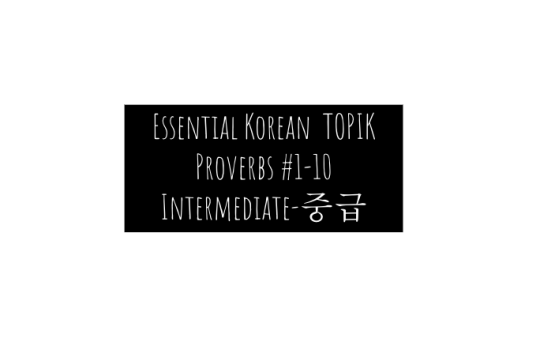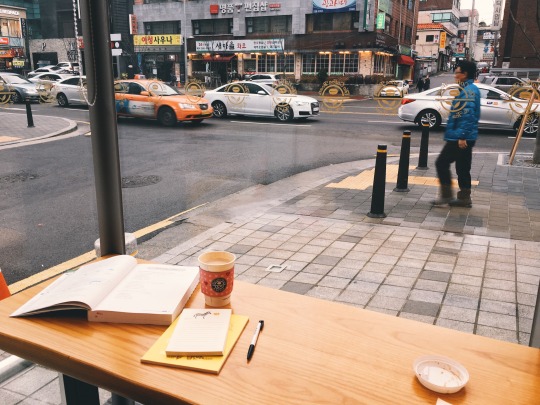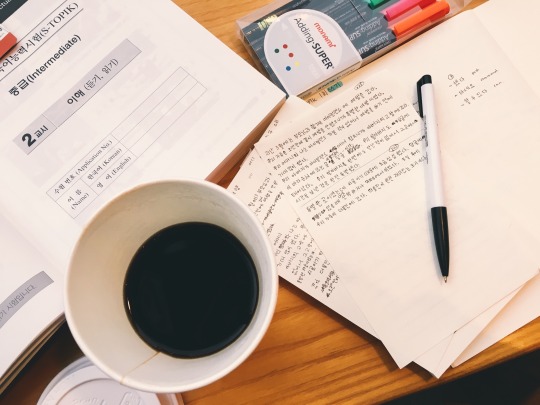Text
Grammar -(으)ㄹ 바에 Might as well, I would rather..
앞 문장의 일이 화자의 기대에 못 미쳐서 어쩔 누 없이 뒤 문장을 선택함을 나타낸다.
~(으)ㄹ 바에(야/는) = In a situation where ____ I would rather/it would be better to ____.
When you link two actions with -(으)ㄹ 바에, you imply that the first action or option is much worse than the second action or option, or it is so disappointing that you would rather choose the second option.
차라리, 오히려, -(으)는 것 보다는
바 is a dependent noun that is rarely used on its own, and when paired with other verbs, 바 can mean “method”, “content”, or “situation”. Used in -(으)ㄹ 바에, 바 means “situation” or “fact”
Verb stem + -(으)ㄹ 바에
= Verb stem + -(으)ㄹ 바에야
= Verb stem + -(으)ㄹ 바에는
examples:
식은 라면을 먹을 바에는 그냥 안 먹을게요.
If I have to eat ramyeon noodles that have become cold, I would rather just not eat (at all).
그 사람이랑 여행을 갈 바에는 저는 차라리 그냥 집에 있겠어요.
If I have to go on a trip with him, I would rather just stay at home.
너랑 결혼할 바에야 평생 혼자 사는 게 낫지.
If I have to marry you, it would be better living by myself forever.
그 가격에 그곳으로 여행을 갈 바에 차라리 국내로 가는 게 낫겠어요.
I would rather travel inside the country, than going to that place for that price.
43 notes
·
View notes
Text
Essential Korean Proverbs for TOPIK #1-10

1. 가는 말이 고와야 오는 말이 곱다. (What goes around comes around)
2.가재는 게 편이다. (Birds of a feather flock together)
3.갈수록 태산이다! (Things go from bad to worse)
4.개구리 올챙이 적 생각 못 한다 (People tend to forget what they were like in the past)
5. 겉 다라고 속 다르다 (What one thinks is different from how they behave)
6.고래 싸움에 새우 등 터진다 (Powerless ones suffer when powerful ones fight)
7.공든 탑이 무너지랴 (Hard work is never wasted)
8.그림의 떡 (Impossible to reach; pie in the sky)
9.긁어 부스럼 만들다 (Let sleeping dogs lie)
10.꿩 대신 닭 (Make do with what you got)
428 notes
·
View notes
Text
Occupations in Korean
회계사 - Accountant
배우 - Actor, Actress
건축가 - Architect
예술가 - Artist
운동선수 - Athlete
저자 - Author
이발사 - Barber
미용사 - Beautician
사업가 - Business person
사장 - CEO
요리사 - Chef
사무원 - Clerk
회사원 - Company employee
치과 의사 - Dentist
피부과 의사 - Dermatologist
디자이너 - Designer
조사자 - Detective
영양학자 - Dietitian
의사 - Doctor
전기 기사 - Electrician
엔지니어 - Engineer
기업가 - Entrepreneur
농부 - Farmer
수방관 - Firefighter
승무원 - Flight attendant
정원사 - Gardener
미용사 - Hairdresser
아이돌 - Idol
변호사 - Lawyer
구조원 - Lifeguard
마술사 - Magician
정비사 - Mechanic
모델 - Model
영화 감독 - Movie director
음악가 - Musician
보모 - Nanny
간호사 - Nurse
목사 - Pastor
약사 - Pharmacist
사진사 - Photographer
내과 의사 - Physician
조종사 - Pilot
배관공 - Plumber
경찰관 - Police officier
정치가 - Politician
교사 - Professor
신부 - Priest
교장선생님 - Principal
부동산업자 - Real estate agent
기자 - Reporter
영업 사원 - Salesperson
비서 - Secretary
안전요원 - Security guard
가수 - Singer
사회복지사 - Social worker
택시기사 - Taxi driver
선생님 - Teacher
번역가 - Translator
작가 - Writer
2K notes
·
View notes
Text
TOPIK 2 Writing Tips
the following are some expressions to use for your writing!
Classifying
~에는 ~이/가 있습니다.
~는 ~와/과 ~으로 나눌 수 있습니다.
Reason and cause
~으로 인해 ~ 게 된 것입니다.
~의 원인은 ~인 것으로 나타났습니다.
Explaining Survey Results
~가 1위로 꼽혔고 ~이/가 그 뒤를 이었습니다.
~에 대해 ~을/를 대상으로 설문 조사를 실시했습니다.
I hope it’s useful :)
31 notes
·
View notes
Text
TOPIK Level II Vocabulary
I have been studying some past tests for TOPIK Level II and here are some vocabulary words I encountered! These particular words are from test #47
1. 감소하다 decrease/ diminish
2. 경우 case/ circumstance
3. 분야 area/field/branch/realm
4. 분야별 sector(al)/ field
5. 세부 details/particulars
6. 통계 statistics/ stats
7. 문학 literature
8. 고전 classic(s) (ex: literature)
9. (자기) 계발 (self) improvement/ develop
10. 유아 child/toddler/preschooler
11. 농구 basketball
12. 배구 volleyball
13. 켜다 turn on /light up
14. 끄다 put out/ extinguish - turn off/ shut down
15. 환기하다 ventilate - arouse/ awaken/ stir up
16. 참석 attend(ance)/ be present
17. 결석 (be) absent
18. 명단 list/ roll/ directory/ register
19. 배치 arrangement/ placement
20. 인원 the number of people/ persons
21. 수 number (of)
22. 두통 headache/ migraine
23. 정확하다 accurate/ correct/ exact/ precise
24. 전시(회) exhibit/ display (exhibition show)
25. 자료 material/ data/ reference
469 notes
·
View notes
Text
좀 쓰지마세요! DONT USE IT!
Alot of people who speak Korean as a second language, can speak fluently but sometimes it sounds weird. Here are the grammar you should remember but never use when speaking.
THIS IS 꿀팁 (Honey Tip/ Godlen Tip)
This tip is from my Korean Girlfriend ;)
그들은 (They), really I have never heard a Korean use 그들은 that much
The more natural and more common word for ‘They’ is
걔네들 and 그사람들 ( The people)
Your is 너의 but more common is 너네 but you can still use 너의
걔는 and 걔가 is more common than 그녀가 and 그가
I hope this helped.
926 notes
·
View notes
Photo


Practicing the art of using long words and overly descriptive sentences to fit the 600 character goal for TOPIK 4…
3K notes
·
View notes
Text
Grammar -기로서니 Even though, regardless of, no matter how...
아무리 앞의 사실을 인정한다고 해도, 뒤에 오는 사실의 이유나 조건이 뒬 수 없음을 강하게 나타낸다.
Often used with 아무리
“Even though/regardless of/no matter how”. More specifically, you would use it when you want to express that whatever action or state comes in the following clause is very unlikely or has no good reason to happen.
You acknowledge the information in the preceding clause while denying the following clause. For example, you could think of a sentence like, “Even though you bought the wrong brand, that’s no reason for your mom to get so mad at you.”
examples:
아무리 바쁘기로서니 부모님들한테 전화 한 통 하지 않는다는 게 말이 안 된다.
No matter how busy he is, it doesn’t make sense that he can’t call his parents even once.
A: 인생에서 제일 중요한 건 아무래도 돈이라고 생각해요
I think money is the most important thing in life.
B: 돈이 아무리 중요하기로서니 건강보다 중요할까요?
No matter how important money is, can you really say it is more important than health?
초콜릿을 좀 먹었기로서니 이렇게 많이 아플 리가 없잖아. 초콜릿 빼고 또 뭘 먹었어?
Even though you ate bit of chocolate there’s no way you should be this sick. What else did you eat beside the chocolate?
그 걸 아무리 많이 원하기로서니 그냥 훔치면 안 되죠!
No matter how much you want that thing, you can’t just steal it!
그 때 겪은 일은 아무리 힘들었기로서니 그 것만 가지고 남들의 고통을 인정해주지 않는 게 정말 무례해요.
No matter how difficult what you experienced at that time was, it’s really rude to use that to disregard others’ pain.
소미 씨가 아무리 선생님이기로서니 주말에도 남의 아이들이랑 놀고 싶어하겠어요?
Even though Somi is a teacher, do you think she wants to play with other peoples’ kids even on the weekend?
저 사람이 아무리 유명한 가수이기로서니 어딜 가든 계속 팬들이랑 인사하고 사인해주고 싶겠어요?
Even though that person is a famous singer do you think they would want to greet fans and do signatures wherever they go?
Has the same meaning as -아어도 -다고 해서
example:
아무리 집안 사정이 어렵기로서니 남의 물건에 손을 대면 되겠어요?
= 아무리 집안 사정이 어려워도 남의 물건에 손을 대면 되겠어요?
=아무리 집안 사정이 어렵다고 해서 남의 물건에 손을 대면 되겠어요?
0 notes
Text
Grammar -(으)ㅁ에도 불구하고 Despite/in spite of
앞 문장의 상태나 상황에서 자연스럽게 연상되는 결과와는 다른 결과가 나오게 되었음을 나타낸다.
Noun + -에도 불구하고 = despite + Noun
Verb stem + -는데도 불구하고 = despite/although + Verb
Since 불구하고 is very formal, if you want to say the same thing in a less formal manner, you can just use the structure “Verb stem + -는데도” without adding “불구하고” at the end. This is only applicable to verbs.
안 좋은 날씨에도 불구하고 축구경기를 계속했어요.
In spite of the bad weather the football match went ahead.
위험함에도 불구하고 남자는 극한 스포츠를 하고 싶어요.
Despite the danger the man still wanted to do extreme sports.
늦은 출발했음에도 불구하고 비행기가 예정대로 서울에 도착했어요.
Despite leaving late the flight still arrived in Seoul on schedule.
키가 작음에도 불구하고 그는 농구를 잘 하고 많은 점수도 얻었어요.
Despite being short he is a good basketball player and scored a lot of points.
경고에도 불구하고 전혀 달라진 것이 없어요.
Despite the warning, nothing has changed at all.
(Less formal = 경고했는데도 전혀 달라진 게 없어요)
그 용의자는 증거가 있는데도 불구하고 무죄로 풀려났습니다.
Although there was evidence, the suspect was declared innocent and was released.
(Less formal = 그 용의자는 증거가 있는데도 무죄로 풀려났어요.)
정부의 노력에도 불구하고, 물가가 계속 상승하고 있습니다.
Despite the government’s efforts, prices are on a constant rise.
(Less formal = 정부가 노력을 하는데도, 물가가 계속 오르고 있어요.)
이미 충분히 설명을 했는데도 불구하고 아직도 모르겠다고 합니다.
Despite having provided enough explanation, they say they still don’t get it.
(Less formal = 이미 충분히 설명을 했는데도 아직도 모르겠대요.)
2 notes
·
View notes
Text
Grammar -(으)ㄹ라치면 Everytime!
어떤 의도를 가지고 행동을 할 때마다 뒤 문장의 상황이 이러나 그 행동을 하기 힘듦을 나타낸다.
Every time you intend to do something, something else happens that makes it hard or impossible to do that thing
Basically just for complaining.
-(으)ㄹ라치면 is not common in spoken Korean. It is more of a written form. If you want to make a spoken complaint to similar effect, you can use ‘-(으)려고 할 때마다’ or ‘-(으)려고 하면’.
examples:
잠깐이라도 눈을 붙일라치면 아기가 울어서 쉴래야 쉴 수가 없어요
Every time I try to nap my child is crying, so I can never rest.
그 유명한 카페에 갈라치면 매번 휴업이에요!
Every time I mean to go to that famous cafe, they’re closed!
모처럼 친구하고 만날라치면 친구가 아프다 해서 못 만나요.
Every time I mean to meet up with my friend, she gets is sick and can’t meet.
항상 공부할라치면 잠이 쏟아지는 이유가 뭘까요?
Why is it that every time I mean to study, I become sleepy?
0 notes